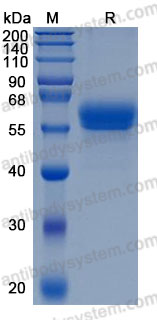Catalog No.
AHN36401
Biological activity
Measured by its ability to induce adhesion of ATDC5 mouse chondrogenic cells. recombinant human Osteomodulin/OMD (Cat #: AHN36401), immobilized at 20 µg/mL (100 µL/well) can induce more than 35% of ATDC-5 cell adhesion.
Expression system
Mammalian Cells
Species
Homo sapiens (Human)
Protein length
Gln21-Glu421
Nature
Recombinant
Endotoxin level
<0.1 EU/μg of the protein by the LAL method.
Purity
>90% as determined by SDS-PAGE.
Accession
Q99983
Applications
Bioactivity, ELISA, Immunogen, SDS-PAGE, WB
Form
Lyophilized
Storage buffer
Lyophilized from a solution in PBS pH 7.4, 5% Trehalose, 5% Mannitol.
Reconstitution
Reconstitute in sterile water for a stock solution. A copy of datasheet will be provided with the products, please refer to it for details.
Shipping
In general, proteins are provided as lyophilized powder/frozen liquid. They are shipped out with dry ice/blue ice unless customers require otherwise.
Stability and Storage
Use a manual defrost freezer and avoid repeated freeze thaw cycles. Store at 2 to 8°C for one week. Store at -20 to -80°C for twelve months from the date of receipt.
Alternative Names
Osteoadherin, KSPG osteomodulin, Keratan sulfate proteoglycan osteomodulin, OMD, Osteomodulin, SLRR2C, OSAD
Osteomodulin downregulation is associated with osteoarthritis development., PMID:37730805
Glycoprotein Injectable Hydrogels Promote Accelerated Bone Regeneration through Angiogenesis and Innervation., PMID:37712303
Osteomodulin contributes to keloid development by regulating p38 MAPK signaling., PMID:37017425
Osteomodulin protects dental pulp stem cells from cisplatin-induced apoptosis in vitro., PMID:35781607
Complement Factor H-Related Proteins FHR1 and FHR5 Interact With Extracellular Matrix Ligands, Reduce Factor H Regulatory Activity and Enhance Complement Activation., PMID:35392081
Osteomodulin attenuates smooth muscle cell osteogenic transition in vascular calcification., PMID:35184400
Osteomodulin Gene Expression Is Associated With Plaque Calcification, Stability, and Fewer Cardiovascular Events in the CPIP Cohort., PMID:35135320
Osteomodulin is a Potential Genetic Target for Hypertrophic Cardiomyopathy., PMID:33715137
Interaction of Streptococcus pyogenes with extracellular matrix components resulting in immunomodulation and bacterial eradication., PMID:33543018
Osteomodulin positively regulates osteogenesis through interaction with BMP2., PMID:33542209
Immunolocalization of Keratan Sulfate in Rat Spinal Tissues Using the Keratanase Generated BKS-1(+) Neoepitope: Correlation of Expression Patterns with the Class II SLRPs, Lumican and Keratocan., PMID:32235499
Carboxymethyl cellulose/diclofenac bioactive coatings on AISI 316LVM for controlled drug delivery, and improved osteogenic potential., PMID:31887952
Osteoadherin serves roles in the regulation of apoptosis and growth in MC3T3‑E1 osteoblast cells., PMID:31638177
Characterization of Parkinson's disease using blood-based biomarkers: A multicohort proteomic analysis., PMID:31603904
Class I and Class II small leucine-rich proteoglycans in human cutaneous pacinian corpuscles., PMID:31005573
Genome-wide associations and detection of potential candidate genes for direct genetic and maternal genetic effects influencing dairy cattle body weight at different ages., PMID:30727969
The role of osteomodulin on osteo/odontogenic differentiation in human dental pulp stem cells., PMID:30670012
Short Leucine-Rich Proteoglycans Modulate Complement Activity and Increase Killing of the Respiratory Pathogen Moraxella catarrhalis., PMID:30266767
Comparison of secretome from osteoblasts derived from sclerotic versus non-sclerotic subchondral bone in OA: A pilot study., PMID:29547667
Whole-Proteome Analysis of Human Craniosynostotic Tissue Suggests a Link between Inflammatory Signaling and Osteoclast Activation in Human Cranial Suture Patency., PMID:29369995
A survey of proteomic biomarkers for heterotopic ossification in blood serum., PMID:28472996
Genetic alterations in meningiomas of different textures., PMID:27475668
Osteomodulin regulates diameter and alters shape of collagen fibrils., PMID:26003732
Distinct dysregulation of the small leucine-rich repeat protein family in osteoarthritic acetabular labrum compared to articular cartilage., PMID:25371314
Proteoglycan expression is influenced by mechanical load in TMJ discs., PMID:25348543
Evaluation of bone repair of critical size defects treated with simvastatin-loaded poly(lactic-co-glycolic acid) microspheres in rat calvaria., PMID:25209881
The glycosylation profile of osteoadherin alters during endochondral bone formation., PMID:23337037
Effect of alendronate on endochondral ossification in mandibular condyles of growing rats., PMID:22688305
Application of alternative fixatives to formalin in diagnostic pathology., PMID:22688293
In vitro effects of ascorbic acid and β-glycerophosphate on human gingival fibroblast cells., PMID:22677409
Low-intensity low-frequency ultrasound promotes proliferation and differentiation of odontoblast-like cells., PMID:22515888
Intramyocardial injections of human mesenchymal stem cells following acute myocardial infarction modulate scar formation and improve left ventricular function., PMID:22410280
Osteoadherin accumulates in the predentin towards the mineralization front in the developing tooth., PMID:22355375
Microarray profiling of diaphyseal bone of rats suffering from hypervitaminosis A., PMID:22215263
Molecular analysis of the differentiation potential of murine mesenchymal stem cells from tissues of endodermal or mesodermal origin., PMID:21970410
N-cadherin adherens junctions mediate osteogenesis through PI3K signaling., PMID:21964322
Dental implants osteogenic properties evaluated by cDNA microarrays., PMID:21778890
NC4 Domain of cartilage-specific collagen IX inhibits complement directly due to attenuation of membrane attack formation and indirectly through binding and enhancing activity of complement inhibitors C4B-binding protein and factor H., PMID:21659506
Gene expression profiling of connective tissue growth factor (CTGF) stimulated primary human tenon fibroblasts reveals an inflammatory and wound healing response in vitro., PMID:21245951
The tyrosine sulfate-rich domains of the LRR proteins fibromodulin and osteoadherin bind motifs of basic clusters in a variety of heparin-binding proteins, including bioactive factors., PMID:19700767
Complement inhibitor C4b-binding protein interacts directly with small glycoproteins of the extracellular matrix., PMID:19155499
Short leucine-rich glycoproteins of the extracellular matrix display diverse patterns of complement interaction and activation., PMID:18962898
Osteoadherin is upregulated by mature osteoblasts and enhances their in vitro differentiation and mineralization., PMID:18496725
Gene expression of MC3T3-E1 cells on fibronectin-immobilized titanium using tresyl chloride activation technique., PMID:18203463
Proteomic analysis of hydroxyapatite interaction proteins in bone., PMID:18083934
Altered osteoclast development and function in osteopontin deficient mice., PMID:18050311
Osteoclastic activity induces osteomodulin expression in osteoblasts., PMID:17714690
Differential regulation of osteoadherin (OSAD) by TGF-beta1 and BMP-2., PMID:16970923
Heat-induced retrieval of immunogold labeling for nucleobindin and osteoadherin from Lowicryl sections of bone., PMID:16387503
Gene expression profiling of pulpal tissue reveals the molecular complexity of dental caries., PMID:15869869

